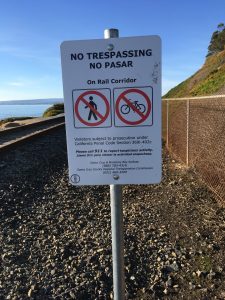
The rail and trail discussion has taken a lot of local bandwidth. 31 miles of beautiful public property deserves the best we can bring to the table.
To put it simply: Rail and Trail will not work; it’s one or the other.
The No Trespassing signs along the rail right of way are aimed at more than encampments; they apply to everyone on foot or wheel. It is the railroad’s legal right to insist on this, their liability, and their obligation. This is the law: No Trespassing on the right of way and for twenty feet on either side of the track (California Penal Code Section 369i-402c).
The storing of Liquefied Petroleum Gas (LPG) in tank cars, now in Watsonville and with the Progressive Rail agreement further up the coast, is dangerous. Recreational uses on the right of way are both illegal and ill-considered by this proximity to hazardous material.
Propane is one of the cleanest burning fossil fuels. It is used safely for domestic heating and cooking, as a fuel additive, and for backyard barbeques. But in transit it is labeled a hazardous, flammable material. Locally it is moved in single walled rail tank cars of about 30,000 gallons, and pressurized up to 250 psi. They display the red hazardous material placard, “UN/NA 1075” and the flammable icon. Generally storage and transit is safe. But when transit or containment of propane goes wrong, it goes very wrong. It even has its own acronym: BLEVE (boiling liquid expanding vapor explosion). It is a firefighter’s nightmare.
The Progressive Rail tank cars will not be empty, no matter what you are told, nor will they “park”. They will be “Storage in Transit”, or SIT. Storage in Transit means the cargo, in this case LPG, is headed to a customer, eventually, and that the transaction is protected by the commerce clause in the US Constitution.
In the rail logistics world Storage in Transit is called a “Warehouse on Wheels”. It allows commodities, such as LPG, to be stored and arbitraged as spot prices change, either “backwardation” or “cotango” in the futures market terms. The price fluctuations in LPG generally follow those of gasoline, and money is made in that spread.
The money for Progressive is not in storing empty tank cars; the money is in the value-add of filled cars available to respond to the LPG spot market. These are standard business models in the rail logistics world. The RTC will have no play and no say.
As the agreement with Progressive states several times: no local Regional Transportation Commission can “materially interfere with the Railway’s Freight Service rights and obligations under federal law, or rights under the Freight Easement, unless first approved by the STB” (the federal Surface Transportation Board). There is no going back, and no local recourse, once the Progressive deal is penned.
Everything else in the deal is blowing smoke to gratify Directors Dondero and Mendez, who have taken what they thought was the path of least resistance. Instead they have led us to the point where the most beautiful place on earth is a rail siding for hazardous material.
The route forward is to legislatively or administratively amend California Public Utilities Commission (CPUC) section 99640 (the Branch Line purchase) and to immediately begin taking advantage of and implementing Code of Federal Regulations (CFR) Title 49 §1152.29 “Prospective use of rights-of-way for interim trail use and rail banking.”
Originally published in the Santa Cruz Sentinel, June 3, 2018
